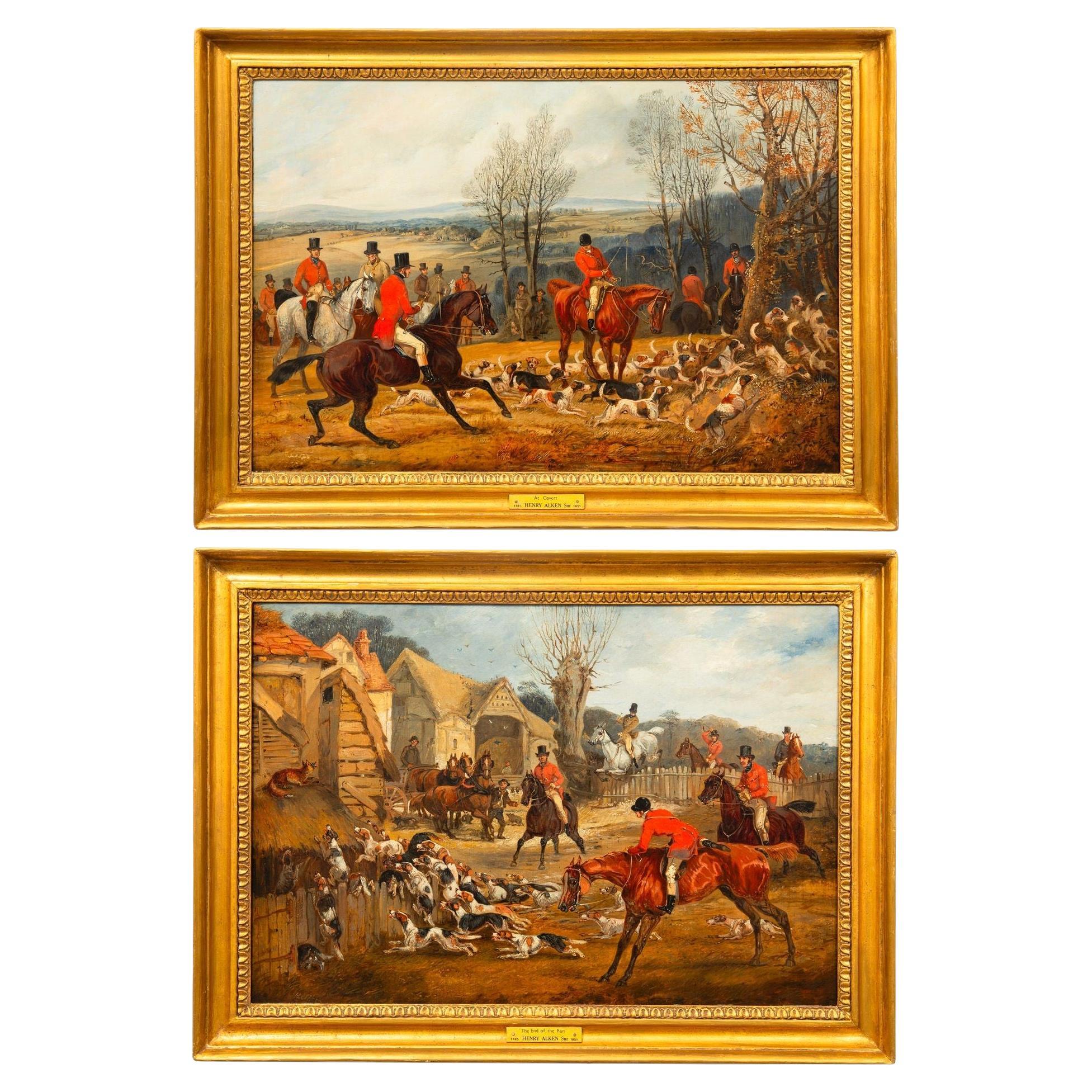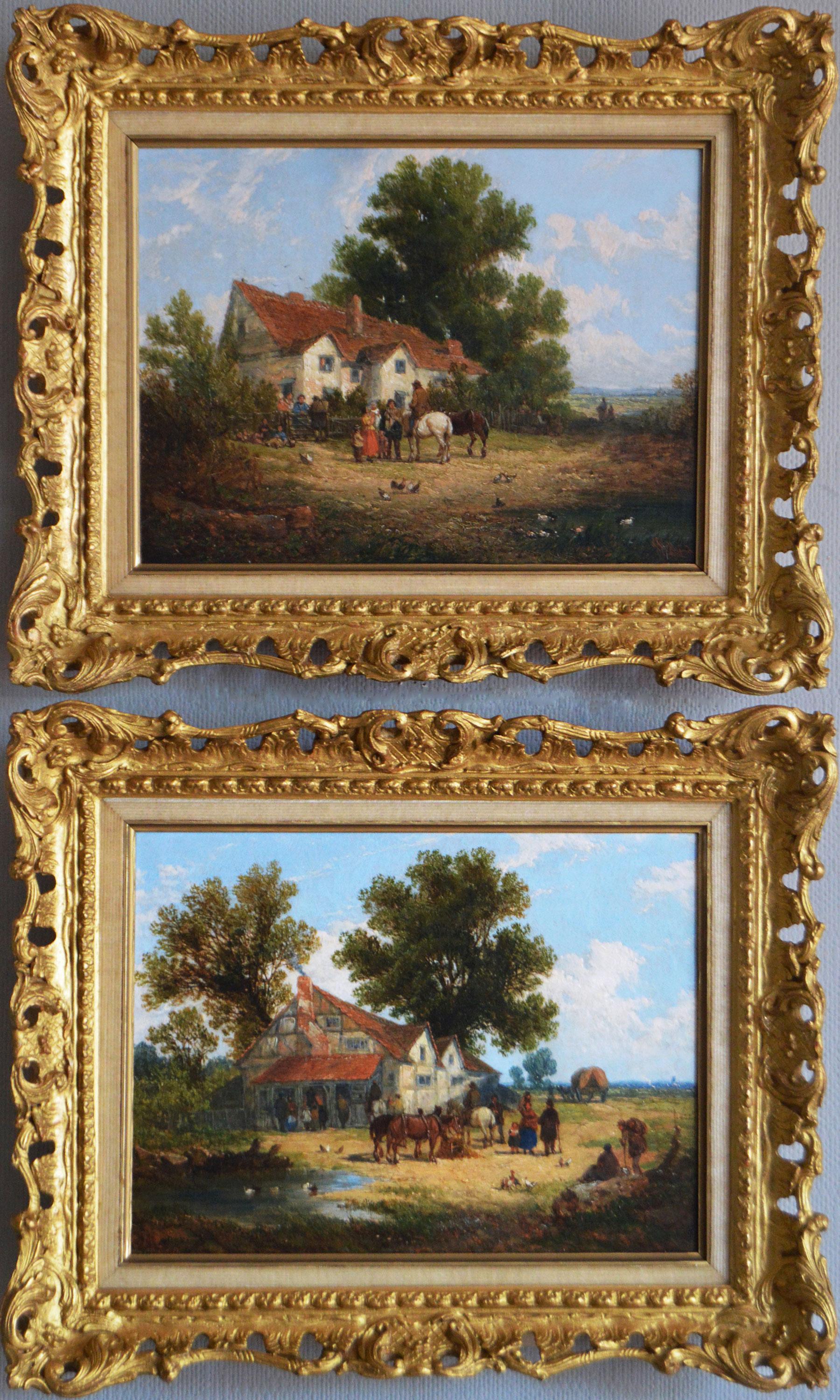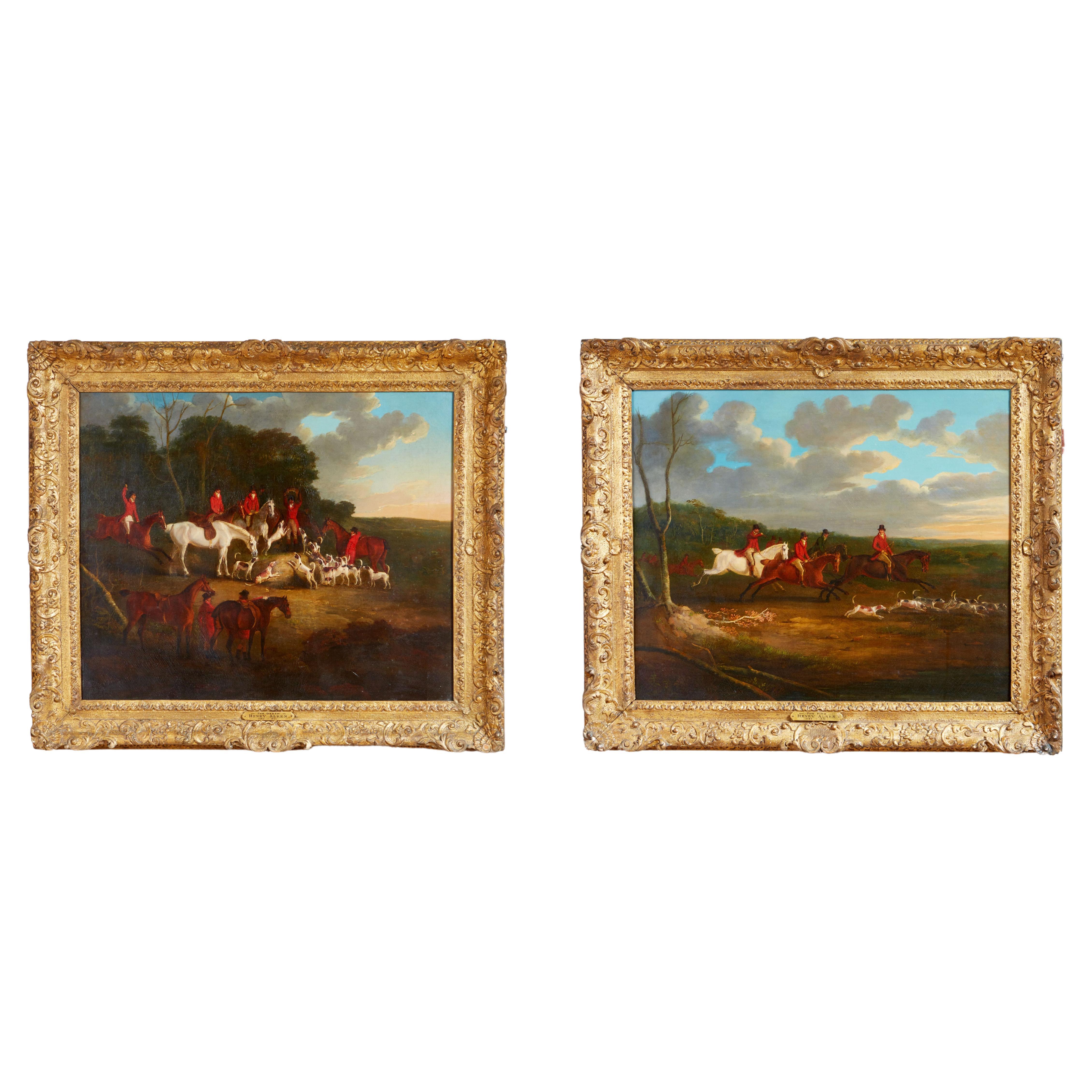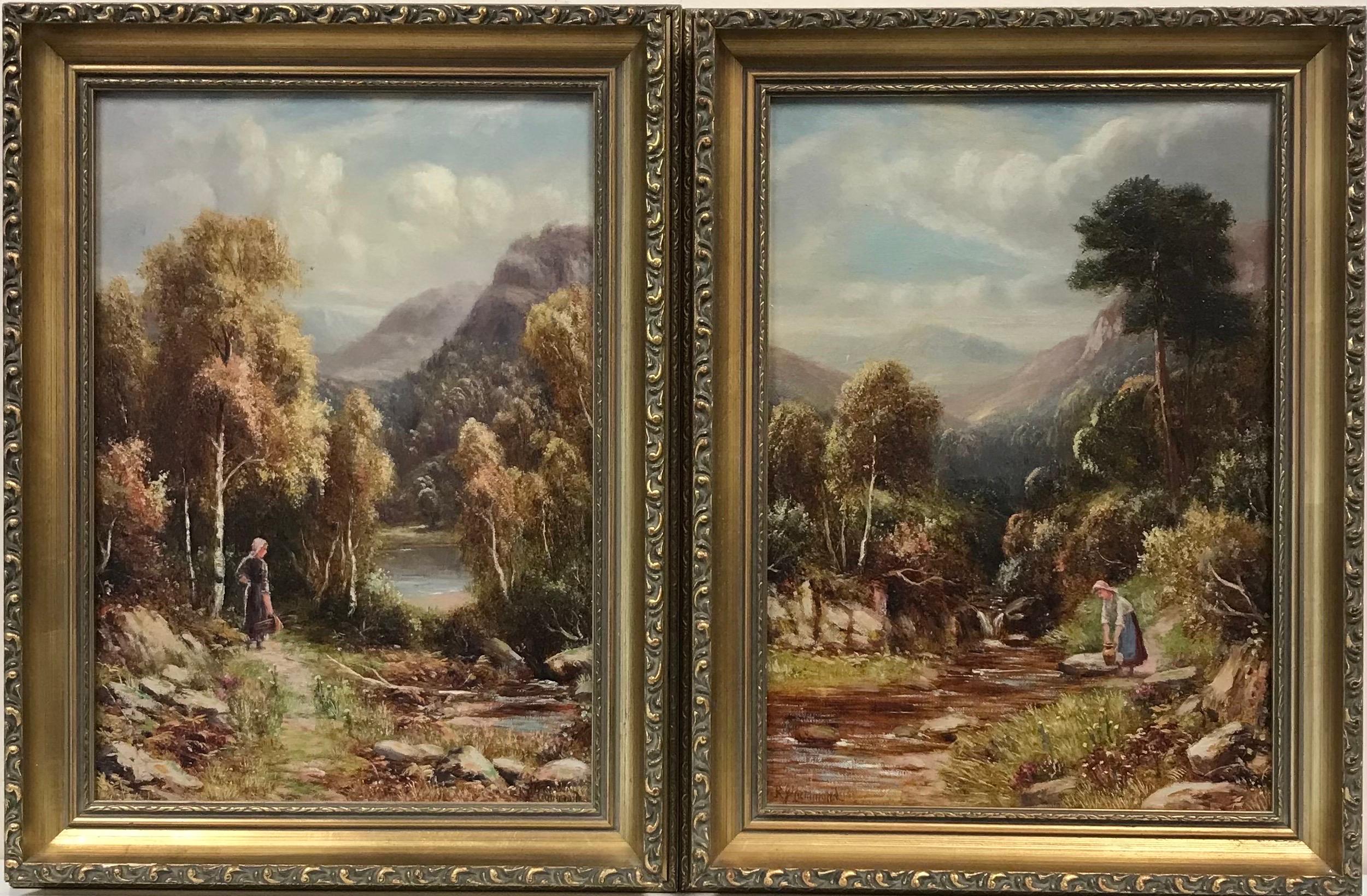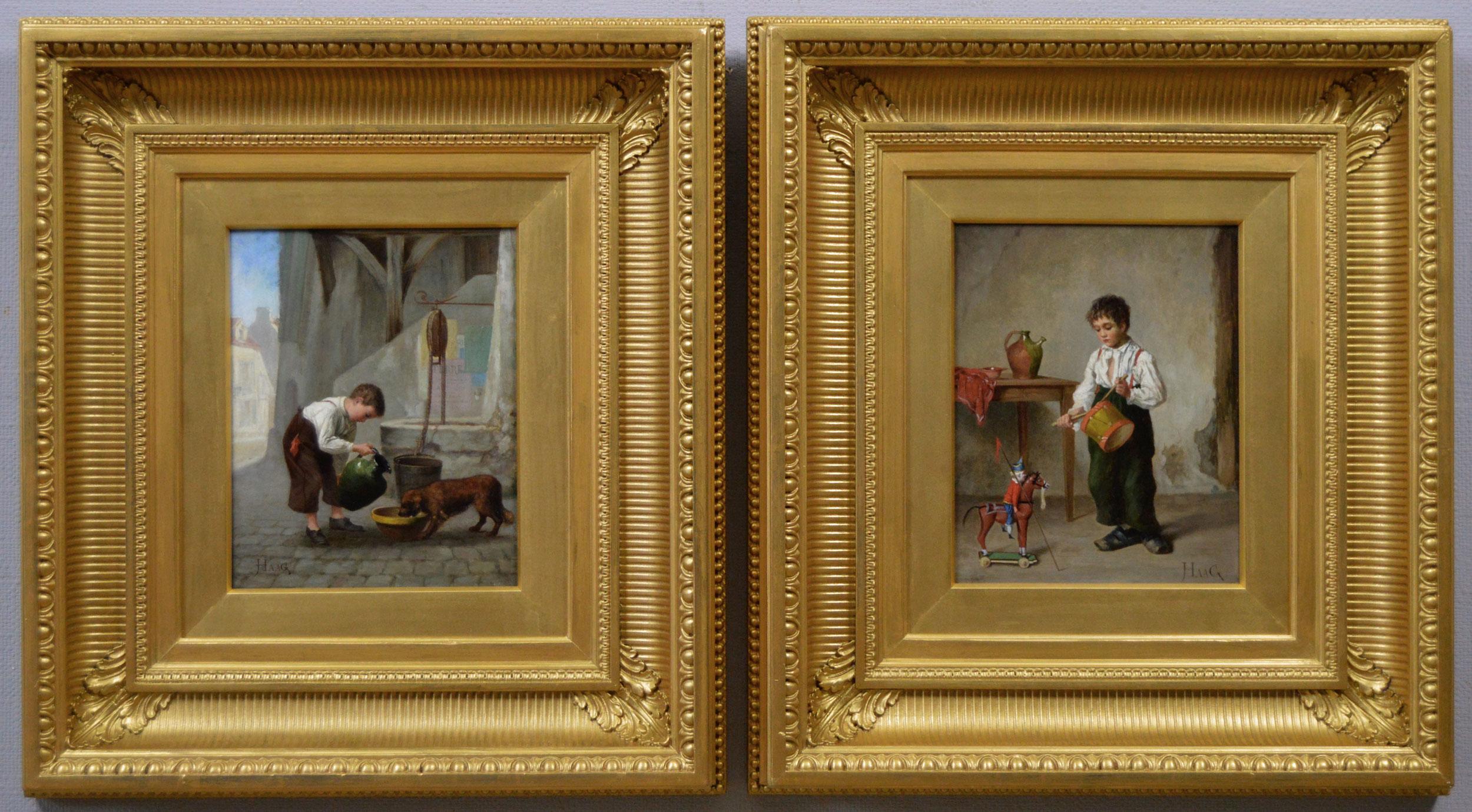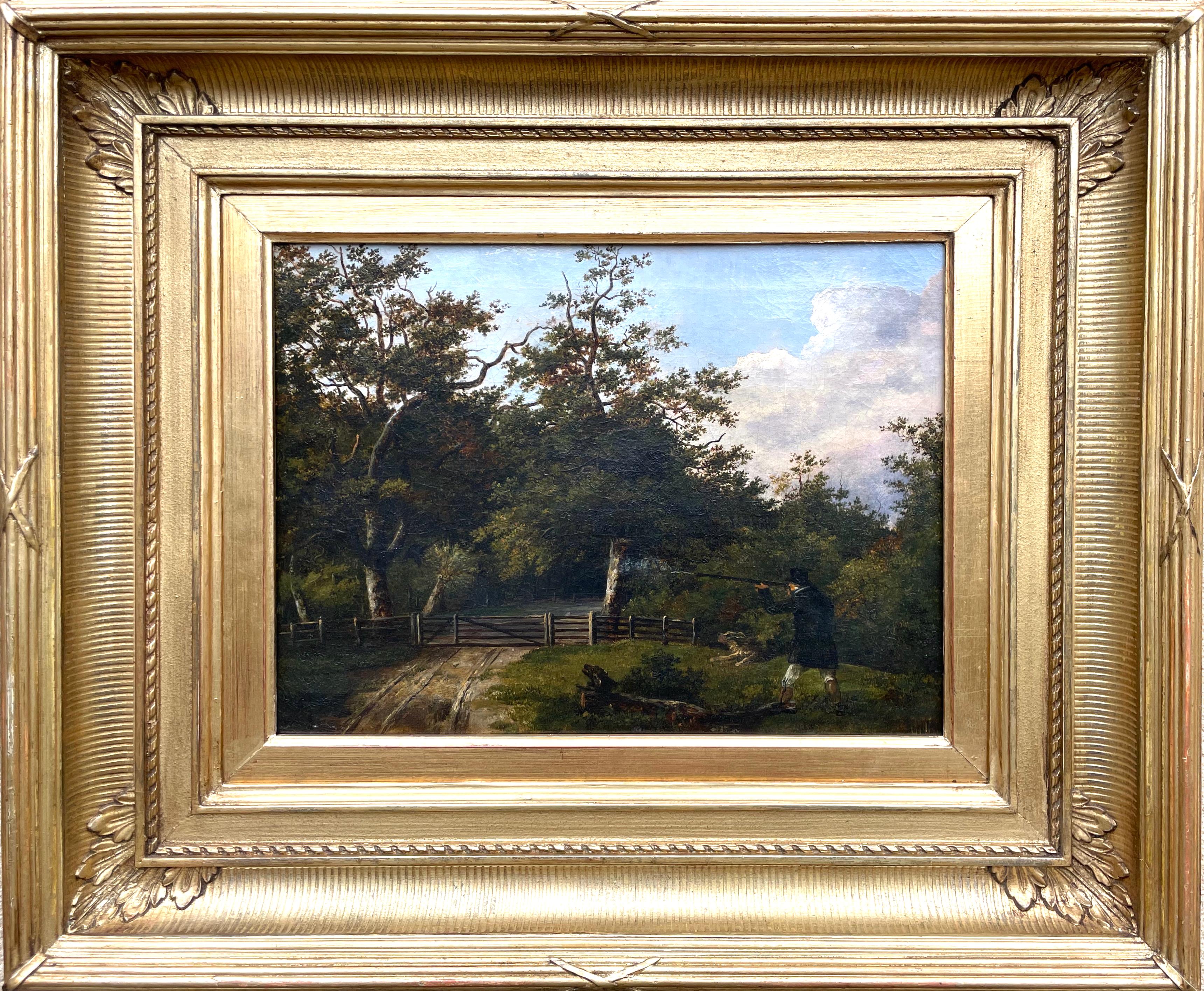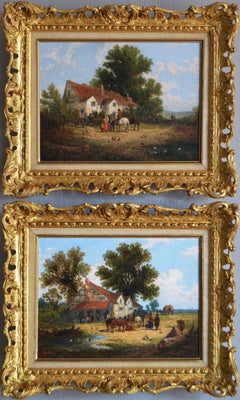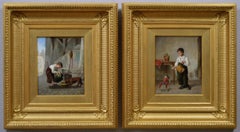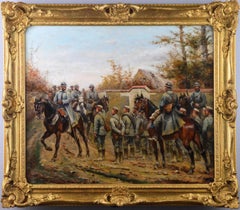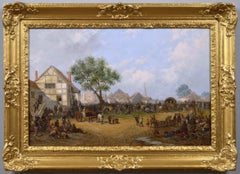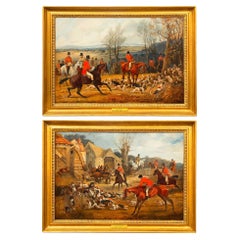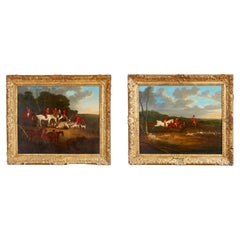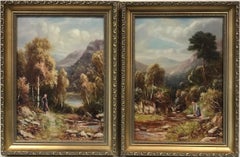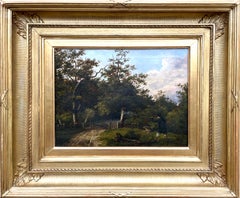Items Similar to Pair of 19th Century military oil paintings of volunteer rifle soldiers
Want more images or videos?
Request additional images or videos from the seller
1 of 21
Frederick Henry Howard HarrisPair of 19th Century military oil paintings of volunteer rifle soldiers1872
1872
$28,730.66
£21,000
€24,706.93
CA$39,457.25
A$44,160.46
CHF 23,058.65
MX$538,760.21
NOK 292,699.35
SEK 277,753.66
DKK 184,499.68
Shipping
Retrieving quote...The 1stDibs Promise:
Authenticity Guarantee,
Money-Back Guarantee,
24-Hour Cancellation
About the Item
**PLEASE NOTE: EACH PAINTING INCLUDING THE FRAME MEASURES 26.25 INCHES X 37.25 INCHES**
Frederick Henry Howard Harris
British, (1829-1901)
Volunteer Rifle Soldiers by a Country House & Companion
Oil on canvas, pair, one signed & dated 1872
Image size: 19.5 inches x 30.5 inches (each)
Size including frame: 26.25 inches x 37.25 inches (each)
A fantastic pair of military paintings of British Volunteer Soldiers at an encampment by Frederick Henry Howard Harris. The paintings depict the annual fortnightly camp of two volunteer Rifle Corps. Britain has a long history of recruiting part-time civilian soldiers to help defend its shores, using conscription from 1757. The conscription ballot ended in the early 19th century, however troop shortages after the Crimean War (1854-56) prompted the creation of the volunteer force movement in 1859. Many local Volunteer rifle, artillery and engineer corps were subsequently formed, consisting of men from local trades and businesses. From 1859 to 1908 they played a vital role in national defence until the formation of the Territorial force. The part-time soldiers were required to train for certain number of days each year as well as attend an annual camp which took place over a fortnight. The camps were mainly to provide realistic military training outdoors and were often held on public holidays to prevent inconvenience to employers and employees. They quickly evolved into popular days out for wives and families to visit. Several units had grey uniforms including the Bristol Rifle Volunteers, who also had similar green plumes. (Acknowledgements: Q&C Militaria, Cheltenham and the Royal Birmingham Society of Artists (RBSA) archives).
Frederick Henry Howard Harris was the son of Henry Harris (b.1811), an artist and drawing master and his wife Margaret who lived at 16 Caroline Street, Birmingham. According to official records, he was born on 23 January, 1829 rather than the date of 1826 which has been previously listed. He is also sometimes mistakenly referred to as Francis.
Whilst he was growing up, his parents ran a school in Frederick Street, Edgbaston and it is highly likely he was tutored there by his father and his mother who was a school mistress. His future wife Lucinda Evetts also worked there for a time as an assistant and this is undoubtedly where they first met. By the time of his marriage to Lucinda at Old Church, Edgbaston church on 20 June, 1859 he had established himself as an artist. Together they lived at 18 Harborne road, where his wife later set up a school. Lucinda was nearly 10 years older than him which may have caused a bit of a stir at the time. This could account for the differing birth years recorded on the censuses after their marriage, as they may have wanted to conceal this. As well as travelling around the UK to paint, he also went abroad visiting Europe and Morocco. He exhibited at the Royal Society of Artists, Birmingham becoming a member of the organisation in 1872.
After giving up the school around 1881, the couple moved to Hills Side, Kingscote Road, Edgbaston. Harris spent his final years living at Mariecroft, Margaret Road in Birmingham. He died on 30 December, 1901 at Birmingham.
Examples of his work can be found at the Wolverhampton Art Gallery and the Birmingham Museum.
Presentation: The paintings are housed in new, English made gilt frames which are in excellent condition.
Condition: As with all of our original antique oil paintings, these works are offered in ready to hang gallery condition, having been professionally cleaned, restored and revarnished.
© Benton Fine Art
- Creator:Frederick Henry Howard Harris (1829 - 1901, British)
- Creation Year:1872
- Dimensions:Height: 26.25 in (66.68 cm)Width: 37.25 in (94.62 cm)Depth: 3.25 in (8.26 cm)
- Medium:
- Movement & Style:
- Period:
- Condition:
- Gallery Location:Nr Broadway, GB
- Reference Number:1stDibs: LU15629629522
About the Seller
5.0
Platinum Seller
Premium sellers with a 4.7+ rating and 24-hour response times
Established in 1972
1stDibs seller since 2015
338 sales on 1stDibs
Typical response time: <1 hour
Associations
The British Antique Dealers' AssociationLAPADA - The Association of Arts & Antiques DealersInternational Confederation of Art and Antique Dealers' Associations
- ShippingRetrieving quote...Shipping from: Nr Broadway, United Kingdom
- Return Policy
Authenticity Guarantee
In the unlikely event there’s an issue with an item’s authenticity, contact us within 1 year for a full refund. DetailsMoney-Back Guarantee
If your item is not as described, is damaged in transit, or does not arrive, contact us within 7 days for a full refund. Details24-Hour Cancellation
You have a 24-hour grace period in which to reconsider your purchase, with no questions asked.Vetted Professional Sellers
Our world-class sellers must adhere to strict standards for service and quality, maintaining the integrity of our listings.Price-Match Guarantee
If you find that a seller listed the same item for a lower price elsewhere, we’ll match it.Trusted Global Delivery
Our best-in-class carrier network provides specialized shipping options worldwide, including custom delivery.More From This Seller
View AllPair of 19th century landscape oil paintings of a village
By John Holland Senior
Located in Nr Broadway, Worcestershire
**PLEASE NOTE: EACH PAINTING INCLUDING THE FRAME MEASURES 13.75 INCHES X 16.75 INCHES**
John Holland Snr
British, (1830-1886)
Village Life
Oil on canvas, pair, both signed
Image siz...
Category
19th Century Landscape Paintings
Materials
Canvas, Oil
Pair of 19th Century genre oil paintings of children
Located in Nr Broadway, Worcestershire
**PLEASE NOTE: EACH PAINTING INCLUDING THE FRAME MEASURES 20 INCHES X 18 INCHES**
Jean Pierre Haag
French, (1842-1921)
Daily Chores & Little Drummer Boy
Oil on panel, pair, both sig...
Category
19th Century Victorian Figurative Paintings
Materials
Oil, Panel
Military WW1 oil painting of French Cavalry & German Infantry Soldiers
By Paul Emile Léon Perboyre
Located in Nr Broadway, Worcestershire
Paul-Emile Perboyre
French, (1851-1929)
The Surrender
Oil on canvas, signed & dated 1916
Image size: 20.5 inches x 25 inches
Size including frame: 26.25 inches x 30.75 inches
A well...
Category
Early 20th Century Victorian Figurative Paintings
Materials
Canvas, Oil
19th century landscape oil painting of a village fair
By John Holland Senior
Located in Nr Broadway, Worcestershire
John Holland Snr
British, (1830-1886)
Braintree Fair, Essex
Oil on canvas, signed
Image size: 13.25 inches x 20.5 inches
Size including frame: 19 inches x 26.25 inches
Provenance: Frost & Reed
A lively painting of an annual town fair near Braintree, Essex by John Holland Snr. The middle of the scene shows a crowd of figures dancing on the green next to the Kings Head Inn whilst others watch on. In the foreground, people can be seen conversing with sellers and other visitors.
John Holland Senior was a painter of landscapes and coastal scenes who was born in Nottingham around 1830. He was the son of a painter and brother to Samuel Holland also a painter and sign writer. He was also uncle to his namesake John Holland (1857-1920) whom he taught to work in charcoal and Samuel S. Holland, both of whom were artists.
By 1861, he had become a full time artist exhibiting at Suffolk Street from around this time until 1879, at the British Institution between 1865-1866 as well as exhibiting locally in Nottingham. He never married and lived for many years with his father, brother and his family at Vernon Street, Nottingham. Around 1867, he moved to Hebden Bridge in West Yorkshire where he exhibited locally. He would also often travel around the British countryside and coast to paint.
He spent a few years in West Yorkshire but by 1871 had moved back to live with his family in Nottingham. However, he spent his final years living at Trebray Lodge, Tintagel, Cornwall where he died on 7 February 1886.
A number of his works are held by the Buxton Museum, Calderdale Metropolitan Borough Council, Nottingham Art Gallery and the Williamson Art Gallery.
Presentation: The painting is housed in a new, English made gilt frame which is in excellent condition. The reverse bears a label for Frost & Reed, a well-known fine Art Gallery, frame maker and fine art publisher founded in Bristol in 1808 by William Hill. The business was bought by John Frost in 1859 who ran it until his death in 1875. His nephew Walter Frost took over the business and in 1881 brought in William Reed...
Category
19th Century Landscape Paintings
Materials
Canvas, Oil
19th Century landscape oil painting of figures harvesting
By Joseph Thors
Located in Nr Broadway, Worcestershire
Joseph Thors
British, (1835-1920)
Harvest Time
Oil on canvas, signed
Image size: 19.25 inches x 29.25 inches
Size including frame: 26.25 inches x 36.25 inches
This wonderfully deta...
Category
19th Century Victorian Landscape Paintings
Materials
Canvas, Oil
19th Century sporting oil painting of a hunting meet
By Edward Benjamin Herberte
Located in Nr Broadway, Worcestershire
Edward Benjamin Herberte
British, (1830-1896)
The Meet
Oil on canvas, signed & dated 1890, embossed makers mark to stretcher
Image size: 15.5 inches x 23.5 inches
Size including fra...
Category
Late 19th Century Landscape Paintings
Materials
Canvas, Oil
You May Also Like
Fine Pair of English Antique Oil Hunt Scene Paintings by Samuel Henry Alken
By Henry Alken
Located in Shippensburg, PA
SAMUEL HENRY GORDON ALKEN
British, 1810-1894
"At Covert" & "The End of the Run"
Oil on canvas "The End of the Run" signed lower left "H. Alken"
16 7/8" H x 23" W x 1 7/8" D [fram...
Category
Antique 19th Century English Romantic Paintings
Materials
Canvas, Paint
Pair of Hunt Paintings Attributed to Henry Alken
By Henry Alken
Located in Greenwich, CT
A pair of oil on canvas hunt paintings attributed to Henry Alken (1785-1851) entitled "The Find" and "The Death", in original giltwood frames.
Provenance: Provenance: The Hon. Mr...
Category
Antique 19th Century English Paintings
Materials
Canvas, Paint
Fine Victorian Pair of Original Oil Paintings Figures Scottish Highland scenes
Located in Cirencester, Gloucestershire
Artist/ School: Robert John Hammond (British, exhibited 1882-1911)
Hammond was a painter of landscapes, animals and rural scenes.
Hammond was thought to be based in and around Birmi...
Category
19th Century Victorian Landscape Paintings
Materials
Oil
Oil Painting, Small Shooting Scene By Chapman Bayley (British, Active 1818-1832)
Located in Uppingham, GB
Oil on canvas Shooting by the woods by Chapman Bayley (1818-1832)
Early 19th Century gent standing by the woods with his two dogs shooting.
Signed by the artist in original frame.
Ch...
Category
1820s English School Figurative Paintings
Materials
Oil
Fine Large 19th Century Rural Traditional Landscape Signed Oil Painting Figures
Located in Cirencester, Gloucestershire
The Country lane
by Frans Hopfner (1840-1893) German
signed oil on canvas, framed
framed: 23.5 x 41.5 inches
canvas: 18 x 36 inches
provenance: private collection, UK
condition: very...
Category
19th Century Victorian Landscape Paintings
Materials
Oil, Canvas
Huge Traditional Oil Painting Soldiers on Horseback Lakeland Landscape signed
Located in Cirencester, Gloucestershire
Artist/ School: American School, 20th century, indistinctly signed
Title: Soldiers on Horseback
Medium: signed oil painting on canvas, framed.
framed: 31.75 x 43.75 inches
canva...
Category
20th Century Victorian Landscape Paintings
Materials
Oil
More Ways To Browse
19th Century European Oil Paintings
Antique Military Painting
C Howard
Britains Soldiers
19th Military Painting
19th Century Military Paintings
Pair Antique Oil Painting
Mistress Painting
19th Century Military Oil Paintings
Antique Soldier Painting
16x20 Gilt Frame
Antique British Uniforms
Old Master Q
Howard Church Painting
Moroccan Rifle
Corelli Italian
David Hanna
Dawn Goddess
